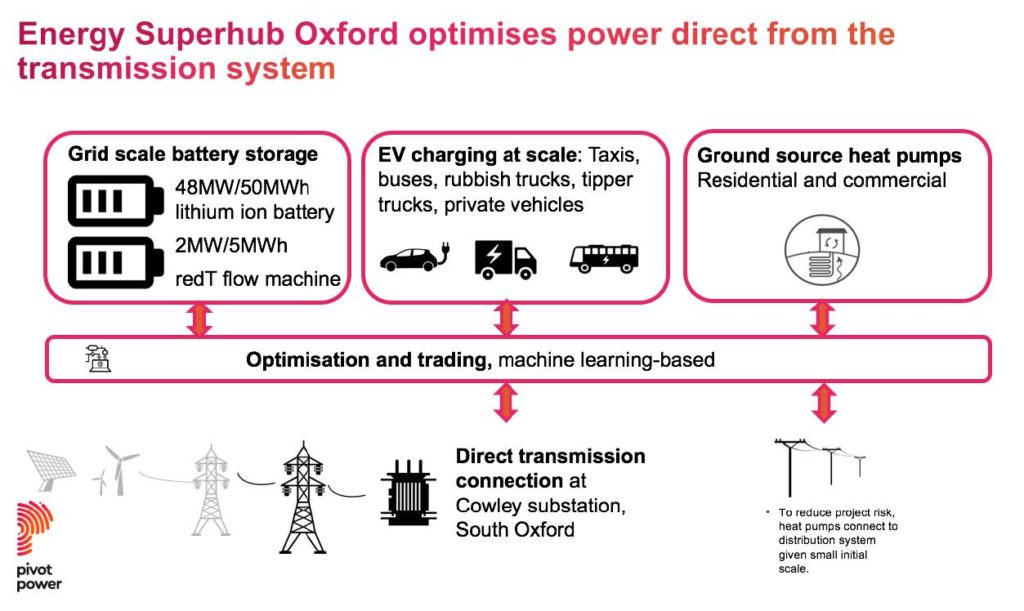
(This leading example of grid-scale energy storage applications was originally published on redtenergy.com, April 3, 2019)
- A £41m world-first Energy Superhub will be built in Oxford, making it a model for cities around the world to cut carbon and improve air quality, the consortium announced today. The consortium partners are Oxford City Council, Pivot Power, Habitat Energy, Kensa Contracting, redT energy and the University of Oxford
- A multi-million award from the UK’s innovation agency, UK Research and Innovation (UKRI), will accelerate delivery timescales of the project that will use innovative new battery technology and aims to decarbonise both heat and transport.
- The Energy Superhub Oxford project involves the deployment of grid-scale energy storage and supports the decarbonisation of mobility, power and heat across the city, supporting Oxford City Council in its journey to zero carbon.
- Pivot Power will create a new connection to the transmission network which will service the largest hybrid battery ever deployed, and power a 10 km network of charging stations that will kickstart an electric vehicle revolution across the city.
- Habitat Energy, an Oxford-based firm, will be providing the intelligence to optimise the trading of the battery storage in the power markets, as well as the timing of the EV charging and heat pump activation to maximise value to the end consumer and benefit to the grid.
- Kensa Contracting will install 300 UK designed and manufactured innovative low-carbon ground source heat pump systems, which will result in 25% lower running costs than traditional gas boilers.
- redT energy, the UK-based energy storage infrastructure specialist, will showcase its cutting-edge vanadium flow batteries.
- The University of Oxford’s Environmental Change Institute and Department of Engineering Science will assess the impacts of the project and advise on how they can be replicated, both across the country and abroad.
UK Research and Innovation (UKRI) will contribute c.£10 million to support the £41 million Energy Superhub Oxford (ESO) project, which will showcase cutting-edge electric vehicle charging, energy storage systems, and low carbon heating, plus smart energy management technologies to support Oxford City Council’s journey to zero carbon. ESO aims to deliver 20,000 tonnes of CO2 per year saving by 2021, rising to 44,000 tonnes per year by 2032.
The Smart Local Energy Systems Demonstrator grant will significantly accelerate the delivery timescales of the Energy Superhub. The project is funded by UK Research and Innovation through the Industrial Strategy Challenge Fund. Project Local Energy Oxfordshire (LEO) led by Scottish and Southern Electricity Networks (SSEN) has also received funding. LEO will explore how the growth in local renewables, electric vehicles (EVs), battery storage, and demand side response can be supported by a local, flexible, and responsive electricity grid unlocking new opportunities for consumers and market providers.
By 2020 the Energy Superhub Oxford consortium will launch the world’s largest hybrid lithium ion / vanadium redox flow machine energy storage system (50 MW) and a network of ultra-rapid and fast charging stations connected directly to the extra-high voltage transmission system. Money-saving ground source heat pumps will subsequently be installed in c.300 buildings and homes. The project proposes to locate the battery near Cowley substation, subject to planning permission from South Oxfordshire District Council.
The City of Oxford will pioneer a model of rapid transport and heat electrification that can be rolled out to other cities to reduce air pollution and support government plans to decarbonise the UK economy. The University of Oxford, together with a UK university-led energy revolution research consortium dubbed EnergyREV and the Energy Systems Catapult “Energy Revolution Integration Service” (ERIS) will study the project to produce reports and recommendations that will support the rollout of similar initiatives elsewhere in the UK, and around the world.
The project aims to reduce emissions and improve public health by accelerating a switch to electric vehicles and decarbonising heating for homes and buildings. Smart software will manage the energy storage, electric vehicle charging and heat pumps, to reduce strain on the grid and allow it to accommodate more renewables. ESO will demonstrate an ecosystem of practical decarbonisation approaches by applying machine learning and grid scale energy storage infrastructure to bypass network constraints.

Pivot Power’s private-wire network across south Oxford will have enough power to charge hundreds of vehicles at the same time. Approximately 100 ultra-rapid and fast chargers will be installed initially at a public charging station on the A34 and at the council’s main vehicle depots. The network will also run past the city’s two main bus depots, providing the opportunity for their fleets to go electric.
Earlier this year the City Council declared a climate emergency in Oxford and committed to continue working with partners across the city and region to deliver widespread carbon reductions. The council will use some of the URKI grant to convert part of its vehicle fleet to electric, with aims to procure new electric vehicles including refuse collection trucks, sweepers, tippers and vans. The funding will also support the Council to work with a partner offering a ‘Try before you Buy’ programme for Hackney Carriage Vehicle drivers in Oxford. This will assist the transition of the black cab fleet from 100% diesel to 100% electric by 2025.
Oxford City Council is a member of Low Carbon Oxford, a network of 40 public/private organisations that aims to reduce citywide emissions by 40% of 2005 levels by 2020.
Councillor Tom Hayes, Executive Board Member for a Safer and Greener Environment said:
“The City Council is working towards a Zero Carbon Oxford to tackle dangerous climate change in the time available to us to save the planet. Uniquely, this £41m once-in-a-generation downpayment on Oxford will move the Council closer to achieving this vision. Leading businesses are investing in Oxford because they recognise that we’re already trialling new technologies exactly like Energy Superhub Oxford. Today’s announcement allows us as a city to embrace our technological future.
“This exciting project will enable the City Council to install more electric vehicle charging points of the kind that charge vehicles quickest. It gives Black Cab drivers additional support to shift from 100% diesel today to 100% electric in the next few years. It enables the council to move our own vehicles to electric on a faster timescale and, crucially, to install heat energy across homes to tackle fuel poverty.”
Habitat Energy will develop the optimisation platform for the project which will control the energy storage, importing and exporting power to help balance the grid second by second, giving it the flexibility to bring more wind and solar onto the system. The optimisation platform will also manage electric vehicles and heat pumps, maximising their use of cheap energy and using them to provide additional flexibility to the electricity network.
From 2020 to 2021 Kensa Contracting will design and install ground source heat pump systems in 300 homes using an innovative shared ground loop system that sees each household with an individual Kensa Heat Pump connected to a larger ambient temperature district heating network. Running costs for this type of system compare well to mains gas boilers, with half the carbon footprint. The optimisation platform is expected to cut heating bills and carbon emissions by a further 25%, developing a tailored plan for each home based on its heat profile and taking advantage of time-of-use tariffs to shift heating demand away from expensive, high carbon times and maximise the use of low carbon, cheap, off-peak power.
The project will see Pivot Power install the world’s largest commercial hybrid energy storage system (50 MW). It will combine the high-power capabilities of a lithium-ion battery with 2 MW / 5 MWh of the heavy cycling, non-degrading characteristics of vanadium redox flow batteries, supplied by UK energy storage experts, redT energy. Utilising both lithium-ion batteries and vanadium redox flow batteries together in one hybrid system, combines the strengths of the two technologies to meet the complex demands of multiple applications while extending the lifespan of the lithium-ion battery.
The use of redT’s flow battery technology, Habitat’s pioneering real-time energy optimisation and trading capacity incorporating degradation management for the lithium-ion element, and the Kensa shared loop ground source heat pump technologies will make the Energy Superhub Oxford project one of the largest examples of real-world Smart Local Energy Systems across energy vectors.
The University of Oxford will evaluate the performance of the energy storage system, and assess the environmental, social and economic impacts of the project on local stakeholders. This will lead to insights into governance and reproducibility, as well as validated performance models of large-scale battery systems.
Government plans to cut carbon emissions and improve air quality could see millions of electric vehicles and heat pumps in use by 2030, and the project will show how this can be achieved while maintaining a stable, efficient, cost-effective electricity network.